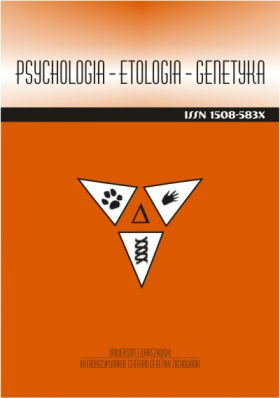Osobowość a centralność wybranych aspektów religijności
Personality and centrality of chosen religiosity dimensions
Author(s): Julia Małgorzata SzymańskaSubject(s): Psychology
Published by: Wydawnictwo Naukowe Scholar Sp. z o.o.
Keywords: personality traits; importance of religiosity; multidimensional theory of religiosity; centrality of religiosity; religiosity dimensions
Summary/Abstract: Examining the relation between the Five-Factor Model personality traits and the centrality of religiosity, including religiosity dimensions, is an important part of S. Huber’s multidimensional theory of religiosity. The aim of the present paper is to verify the impact of personality traits in predicting variance of the level of centrality of religiosity in an individual’s life. The analysis is based on the results obtained by 282 individuals (180 women and 102 men) aged from 17 to 28, all of them Warsaw university students. The variables are measured using the NEO Five-Factor Inventory and the S. Huber’s Centrality of Religiosity Scale. The research results show that personality traits have a predictive value for variance of the centrality of religiosity and the centrality of its dimensions. Agreeableness explains from about 3 to approximately 8% of variance of each religiosity variable. Openness to experience is positively linked to interest in religious questions (explaining 7.3% of variance of this variable), and negatively to religious beliefs and public practice dimensions (explaining 1.7% of variance for each one). Neuroticism and extraversion are positively connected with religious experience, explaining each of them nearly 2% of variance of this religious dimension. No relation is observed between conscientiousness and centrality of religiosity nor centrality of its dimensions.
Journal: Psychologia-Etologia-Genetyka
- Issue Year: 2015
- Issue No: 31
- Page Range: 55-68
- Page Count: 14
- Content File-PDF

